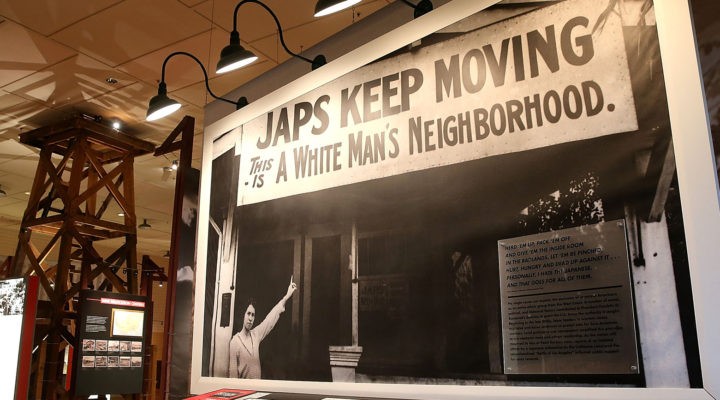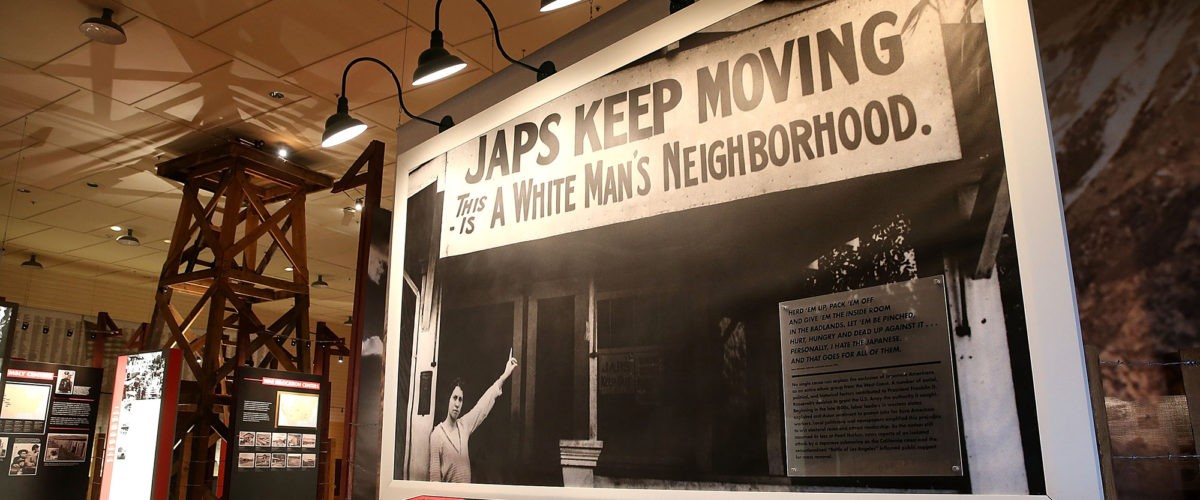Republicans strongly favor the deportation of undocumented immigrants even if it means first rounding them up and placing them in camps guarded by the U.S. military, according to the 2024 American Values Survey.
That attitude coincides with Donald Trump’s campaign promise to invoke the centuries-old Alien Enemies Act to remove an estimated 11 million undocumented immigrants living and working in the U.S., said Robert P. Jones, president of Public Religion Research Institute.
He spoke on an Oct. 16 press call coinciding with release of the annual report.

Robert P. Jones
“And just as a reminder, that act is how we got Japanese internment camps (during World War II) in this country,” Jones explained. “This is something we have done before. It’s not theoretical. It was operationalized.”
Yet PRRI found close to eight in 10 Republicans (79%) would favor such a policy compared to 47% of independents and 22% of Democrats.
Pessimism and angst
The new survey, titled “Challenges to Democracy: The 2024 Election in Focus,” was conducted by PRRI in partnership with the Brookings Institution. It examines attitudes about the upcoming election and the health of U.S. democracy through topics ranging from political violence and immigration to abortion and gender and sexuality.
The research reflects the pessimism and angst that has been mounting from years of shifting racial and religious demographics and the rise of Christian nationalism, Jones explained.
“There is a racial and religious polarization in addition to the theological and political polarization.”
“It’s remarkable today that the Republican Party is 70% white and Christian in a country that is 41% white and Christian, and the Democratic Party today is 25% white and Christian. So, there is a racial and religious polarization in addition to the theological and political polarization.”
The rightward drift on immigration was captured in the overall support for a border wall between the U.S. and Mexico, which increased from 41% in 2016 to 51% this year. Republicans favor the measure 88% to 22% over Democrats.
While most respondents (56%) said they favored pathways to citizenship for undocumented immigrants who meet certain requirements, that share was down from 63% in 2013. Among Republicans, support for such a policy dropped from 53% to 36% in that same span.
Researchers also found a 52% majority in favor of granting legal status to Dreamers — immigrants brought illegally into the country as children.
The report explains: “Support for this policy has decreased since the first time PRRI asked the question in 2018 (62%). More than three-quarters of Democrats (77%) favor allowing children brought to the U.S. illegally to gain resident status, compared with 56% of independents and 27% of Republicans.”
Right or wrong direction
PRRI found an overarching sense of pessimism in Americans across demographics, with seven in 10 saying the nation is headed in the wrong direction. That includes 94% of Republicans, 70% of independents and 41% of Democrats.
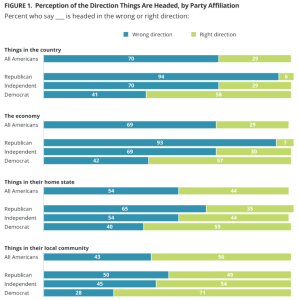 “Among partisans, perceptions of the direction of the country are colored by which party controls the White House. In September 2020, two months before the last presidential election when Trump was president, only one-third of Republicans (33%) felt the country was going in the wrong direction, compared with nearly nine in 10 Democrats (89%).”
“Among partisans, perceptions of the direction of the country are colored by which party controls the White House. In September 2020, two months before the last presidential election when Trump was president, only one-third of Republicans (33%) felt the country was going in the wrong direction, compared with nearly nine in 10 Democrats (89%).”
Few expressed optimism about economic trends, the study adds. “Nearly seven in 10 Americans say the economy is spiraling downward compared to 29% who believe it is headed in the right direction. Nearly all Republicans (93%), most independents (69%) and only 42% of Democrats share that view.”
Most Americans also are pessimistic about the states they live in. Just under 55% said their states are moving in the wrong direction, including 65% of Republicans, 54% of independents and 40% of Democrats.
But only 43% believe their local communities are headed in the wrong direction compared to 56% who said they are headed in a positive direction, PRRI reports. That negative attitude is shared by 50% of Republicans, 45% of independents and only 28% of Democrats.
“Around eight in 10 Americans believe things in their personal lives are headed in the right direction (79%), while under two in 10 say things are headed in the wrong direction (19%),” the report adds. “Solid majorities across all key demographic groups say their personal lives are headed in the right direction.”
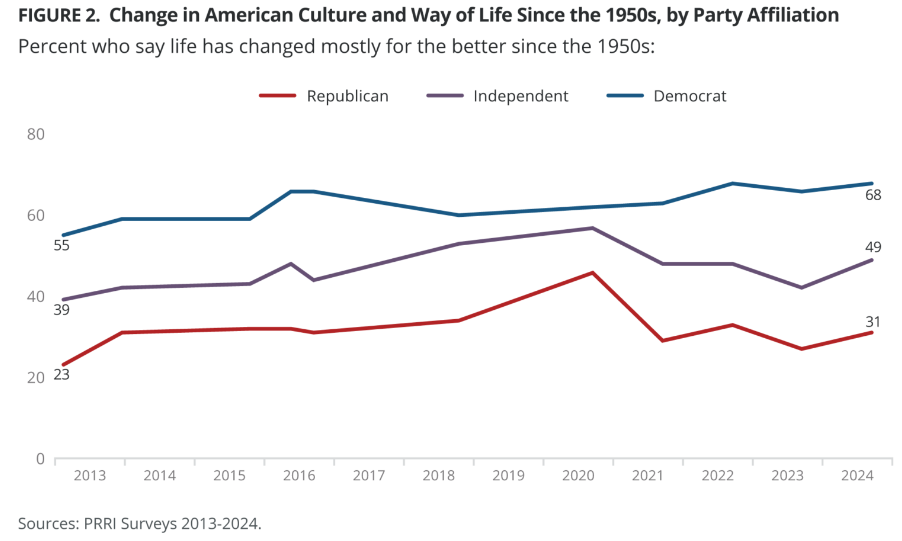
Changed for the better?
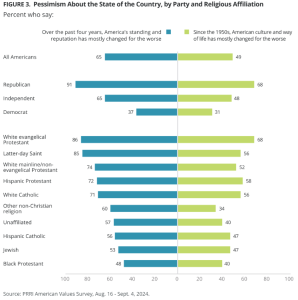 Americans also are divided when asked if the nation has changed for the better (48%) or the worse (49%) since the 1950s, with 68% of Republicans, 48% of independents and 31% of Democrats saying it has changed for the worse. Overall, the split marks a shift of 6 percentage points from 2023 when 44% of Americans cited improvement and 55% saw decline.
Americans also are divided when asked if the nation has changed for the better (48%) or the worse (49%) since the 1950s, with 68% of Republicans, 48% of independents and 31% of Democrats saying it has changed for the worse. Overall, the split marks a shift of 6 percentage points from 2023 when 44% of Americans cited improvement and 55% saw decline.
The closest Republicans came to expressing optimism on the subject was in 2020, Jones said. “There was this one little moment where, at the end of Trump’s term, they were thinking, ‘Oh, things are going for the better,’ and then you can see as soon as he loses it drops right back down.”
Two-thirds of Americans, meanwhile, say the nation’s reputation and standing deteriorated during the past four years, a view held by 91% of Republicans, 65% of independents and only 37% of Democrats.
When PRRI filtered responses by religion, it found a majority of Christian groups also believe America’s reputation and standing had worsened since 2020. They included 86% of white evangelicals, 85% of Latter-day Saints, 74% of white Mainline Protestants, 72% of Hispanic Protestants, 71% of white Catholics and 56% of Hispanic Catholics.
Even majorities of non-Christians (60%), the religiously unaffiliated (57%) and Jewish Americans (53%) say the nation’s reputation and standing has declined. Black Protestants (48%) were the only exception.
Affordable housing
There’s a reason both current presidential candidates are suddenly talking about affordable housing. PRRI found some overlap between partisans when respondents were asked to identify critical issues in the upcoming election.
“Majorities of Republicans (69% and 51%), independents (61% and 51%), and Democrats (57% and 61%) consider the increasing cost of housing and everyday expenses and the health of our democracy to be critical issues,” the report explains.
The responses mirrored those of Americans overall, who rated rising expenses and housing costs (62%) and the health of democracy (53%) as the most critical issues on election day. Less than half identified immigration (44%), crime (43%), health care (42%), abortion (40%) and legal gun access (38%) as leading issues.
“While majorities of Democrats also rate abortion (55%) and health care (52%) as critical issues, majorities of Republicans rate crime (57%) and immigration (71%) as critical issues.”
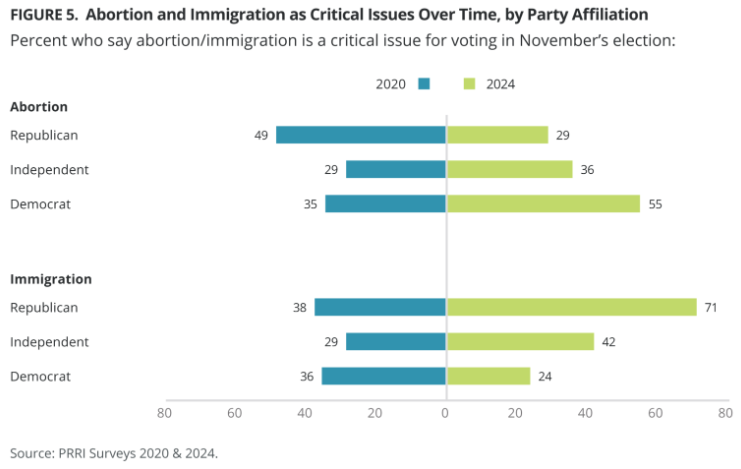
Abortion and immigration
The importance of abortion and immigration have shifted significantly for the two parties since the last presidential election, PRRI says.
For Republicans, the importance of abortion in voting has declined from 49% who considered it key in 2020 to 29% who say the same thing now. Among Democrats, the shift was the opposite, from 29% to 36% who say the issue is most important to them now.
Instead, 71% of Republicans consider immigration a critical issue this year compared to 38% who shared that view in 2020. Among Democrats, 24% say they consider immigration a key issue in 2024 compared to 36% in the previous election.
Still, PRRI identified these topics as “litmus test” issues for those voting along partisan and religious lines.
“Four in 10 Americans (41%) say they will only vote for a candidate who shares their views on abortion, with Democrats (56%) being far more likely than either Republicans (36%) and independents (35%) to say so.”
More than a third of Americans (36%) say they will vote exclusively for a candidate who agrees with their views on immigration. That includes close to six in 10 Republicans, 23% of Democrats and 33% of independents.
The rise in concern about abortion among Democrats follows the U.S. Supreme Court’s 2022 overturning of Roe v. Wade in Dobbs v. Jackson Women’s Health Organization, Jones explained. “This is a post-Dobbs phenomenon that we’re seeing abortion jump up as this higher voting priority for Democrats. It is an inverse of what we’ve historically seen until just the last few years with the striking down of Roe.”
The Republican fixation on immigration corresponds to the rise in extremist anti-immigrant rhetoric that has come to define Donald Trump’s 2024 presidential campaign, Jones said.
“We really need to know how many Americans today believe that immigrants are ‘poisoning the blood of the country.’ Lest that be lost on any of you, that language is straight out of (Adolf Hitler’s) Mein Kampf. This kind of ‘poisoning the blood’ is Nazi rhetoric.”
PRRI reported 61% of Republicans agree with the statement, “immigrants are poisoning the blood of the country,” as do 70% of those who trust far-right news sources, 65% of those who trust Fox News and 60% of white evangelicals.
“Six in 10 Christian nationalism adherents and sympathizers (60%) say illegal immigrants are poisoning the blood of the country, compared with 22% of rejecters and skeptics.”
By comparison, 63% of all Americans disagreed with the statement while only 30% of independents and 13% of Democrats agreed with it.

